|
Reader Advisory: Mature language, imagery, mention of suicide  Tired footsteps bounced off the steel stairway as they filed into the room with the rhythmic beat of a chain gang. It was the basement of a local church. The sign above the door read, “multi-purpose room.” She wondered what other purposes it served aside from offering morsels of unrealized hope to the emotional vagrants who now timidly approached the refreshment table. A carafe of stale coffee, with an aroma that reminded her of her father’s anger in childhood, and rock-hard bagels sat in tempted poses next to a stack of paper napkins and Styrofoam cups. She passed on the tainted nectar everyone else clamored for, and instead, grabbed a bottle of water from the iced cooler on the floor. Gradually, as though one false step might bring down the building, they moved to the circle of chairs, standing in awkward silence, waiting for someone with the courage, to sit first. What the hell. She sat, took a sip of water, and placed the bottle on the floor near the leg of her chair. The others took her lead and gingerly sat, carefully cradling steaming cups of security and rings of petrified confidence. “Welcome,” a white-collared man sang as he entered the room and sat in the only empty chair left in the circle. “I am so glad you all decided to come today. I want you to know that this is a safe space, and anything you share here today will not leave these walls. As you may have noticed, we don’t do the nametag thing, and you aren’t required to announce your name, profession, or any other personal details about yourselves… unless you want to.” He flashed a warm smile to the group, and took a sip from a bottle of water, which then landed gently on the floor. “Who would like to start?” There was an exceptionally long, oppressive silence. Cups moved from laps to lips. Some set their cups on the floor at their feet while they pulled small bites from their bagels. Hesitation hung in the space like branches from a willow tree, hovering in a gentle madness. “Anyone?” nudged the coordinator. A man in a tailored suit with mismatched socks pulled his cup from his mouth. His eyes fell to the floor as he studied the painted lines of a shuffleboard court, where they remained until he stopped speaking. “After we separated, I used to get excited about buying a house. It’s part of why I became a real estate agent. Every morning, I would get out of bed, take the dog outside, feed him, and then spend the next two hours drinking several cups of coffee, searching real estate websites, certain I would find my dream home.” As he continued, his shoulders got lost a little more into the fabric of his jacket. “I never wanted anything ostentatious, just something simple, small and manageable, brick construction – because long-term quality of life with zero maintenance is what’s most important. My house would have a yard for dogs to run in, a deck big enough for a barbeque grill, and a table big enough so my friends didn’t feel crowded… but they’d crowd around it anyway, just for fun.” A small smirk escaped his lips as he took another sip of the stale courage. “Never found it though, doubt I ever will. Not even with all the houses I show other people every week. Now, I just stare out the window, listening for the thunder, watching the rain turn to hail, if I’m lucky.” He let out a defeated sigh. “As I watch the storm, I imagine that the next gigantic gust of wind could rip the roof off the apartment building, decimating every brick and shingle; and I quietly curse myself for choosing to live on the first floor. But the storms never last long enough, and the damned rainbow always peeks its way through in the end. So, I just wait for the next one. But it’s all wasted time. Maybe it makes more sense to move to Kansas… go tornado hunting.” He sank back into his chair, straightened his tie on his chest, and worked hard to evaporate into the background. “Thank you for sharing,” said clergy man. The others in the circle nodded with averted eyes, grateful real estate guy removed the burden of going first. “That was a courageous start to tonight’s meeting. Who would like to share next?” “It was suffocating,” a woman in a pair of beige heels, tweed skirt, and white blouse whispered. Her hair was pulled back in a tortoiseshell comb clip, showing off small silver infinity hoops dangling from her ears. “My job never gives me any personal space, or privacy. I used to fantasize about the idea of living alone like a crack addict craves the next high.” She looked around the room, searching for sympathetic female eyes. Two sets looked back at her with gentle, silent encouragement. A third pair seemed to gaze right past her. “Not just daydreams… serious fantasies, you know, like sex on satin sheets kinds of fantasies.” One of the men snickered, hiding behind averted eyes. Juvenile. “Go on,” comforted clergy man. “That idea of living every day without the frustration of someone else interfering with my time and energy… without any negative requirements of me... that burden… lifted.” She let go a wistful sigh, as if seeing an Adonis wraith. “I imagined life after my divorce perfectly… no more arguments, no more silent treatment, plenty of time and energy to grow my career, read thousands of books, sleep when I was tired, eat when I was hungry, and work out so much that I’d be in the kind of health my doctor planned for me. I’d have the confidence to file arrest warrants on my weaknesses and jail them for life.” Her voice became bolder, and her shoulders became stronger, but her eyes never connected with another living soul. Instead, she described the scene as she imagined it, as she watched it floating somewhere in the rafters. The two supportive women in the room followed her gaze, imagining it, too. “I’d find clarity in long moments of meditation. I’d banish the smallest parts of me, the most inconsequential pieces that could never fend for themselves… off to emotional boot camp… toughen them up… get them ready to take on the real world of possibility. Finally, I’d find eternal happiness.” She slumped back into her chair, her eyes once again staring into the putrid liquid coagulating inside the Styrofoam reservoir in her lap. “Now… I’m lonelier than I’ve ever been in my entire life, and I struggle with the simple day-to-day stuff, like eating and sleeping. I miss him, horribly. I cry in the shower… ugly cry. I let the weakness stretch out it’s kinks for those twenty minutes each day because if I don’t curtail it somehow, the loneliness and the solitude I was stupid enough to choose would turn me inside out… and some days, I have zero control, and it still does… turn me inside out. Fantasies aren’t truth… that’s why they call them that.” The supportive women turned their now tear-filled eyes into their own cups, searching for some reflection of a better ending, but knowing the pain of her failed fantasy. They’d had the same dream, or some version of it. And it failed for them, too. One of them was the next to speak. She was young, far too young, to be so horribly haunted. The woman wore a denim jacket, jeans with holes at the knees, muted teal sneakers, and a t-shirt proclaiming her devotion to The Eagles’ 2015 Farewell Tour… she doesn’t look that old. Her voice cracked just a little. Although she tried to mask it with her stage persona’s strength, she wasn’t as successful at pretending with this group. “The life of an exotic dancer isn’t easy, but I make it work… I guess. The money is good, and the hours are short. I work mostly late at night, when not much else is going on, anyway. I get to sleep in, subscribe to as many streaming services as I like. There are no heavy emotional commitments, and plenty of batteries to do what needs to be done.” The same juvenile snickered again and caught the eyes of everyone in the room this time. They would protect her from the sleaze, albeit silently. “Please go on, Miss; and let’s keep our opinions to ourselves, please. This is a safe space for everyone, remember?” chided the facilitator as he folded his hands in his lap and nodded his encouragement to the young woman. She inhaled slowly, and tried to pick up where she left off, punching her fists into the pockets of her jacket. “When that doesn’t work, there’s always brandy,” she quipped. “For four hours a day, I get to listen to music I enjoy, move around brainlessly in spandex and sparkles, and take a break from the reality of the existential crisis that lives deep inside life. It’s clear, I’ll never be more than this; I can accept that… but why? What’s the point? The lack of empty tables every night proves I’m not the only one asking the question.” She took another breath. “Still, I think I’d like to have that conversation every day with someone else… maybe find some different answers, or at the very least, we could find holes in the crisis big enough to climb out of it together. I think I’d like to try that, at least. And I’d like to try it with the person who used to be my person… again.” The room was quiet for a while. A few people took the opportunity to either throw away their trash or refill their cups. The paster, or priest, or whoever he was, allowed it without commentary. He understood that sometimes, people needed to take a break. When it was clear the meeting wasn’t over yet, the group mingled back to the circle of chairs. A few more moments of silence eavesdropped on the group. At last, a quiet, gentle, middle-aged man leaned in, forearms resting on his knees, hands clasped one over the other. He looked around the room. Expectant faces returned his glances. Although he was attractive… a simple beard, casual clothes, and a baseball cap with a faded logo… there wasn’t anything particularly exceptional about him. Still, he commanded their attention without being overbearing about it. Simple curiosity, maybe… “It’s interesting, don’t you think, where punishment finds us? It beats us up in the dark alleys that we defiantly walk because we aren’t smart enough to recognize that weakness is an armor, of sorts.” He paused, slightly bewildered by the circle’s attention. “No matter how many self-defense courses you take… no matter how proficient you become with your concealed carry permit… you eventually come to realize that Goliath fell not because he wasn’t strong enough to subdue the onslaught. It’s because David had people around him who constantly reminded him of the mistakes he made whenever he started thinking he had a handle on life.” The man sat back and shrugged his shoulders. “In the end, giants are always defeated because of a case of an over-active ego, not because their sword is rusty, or their combat skills are out of date. Still, we convince ourselves that being the giant is somehow better.” He shook his head in frustration. “It’s enough to mess with your head and make you do stupid stuff. Stuff you can never take back, and never repair. So, you end up screwed forever.” The circle nodded in agreement and connectivity. It was clear all of them felt exactly the same way but had no clue how to change any of it. It was, after all, why they’d found themselves together, drinking swill in a basement shuffleboard court. “That’s when the Suicide Hotline is a good resource…” the twelve-step crusader, chimed in. “For those moments when you feel like you are too weak, too alone, too egotistical, or feeling suffocated. It’s not a replacement for this group, but certainly, it’s a good place to turn… when you’re in the middle of a crisis, overwhelmed and maybe need a bit of compassion...” Every eye turned to their feet. No one wanted to think about that. Until that moment, she’d sat quietly, only half-listening, with her back against the metal folding chair, hands interlaced on her head. She noticed the rhythm of her heartbeat gently rocking her forward and back. Imperceptible to the others, and nearly so to her. She held her breath to make sure that’s really where the movement was coming from, and not some errant fault line tremor. It seemed impossible that she could feel it. During the last several months, she’d struggled to recognize that she even had a heart, let alone notice it beating. Huh; that’s different. It prompted her to speak. She drew herself back into the room. Her deep sigh echoed loudly off the cinderblock walls. “He’s got something, there…” The circle raised their heads in surprise. “Seriously. I was on that website the other day. They have all the information you could ever need. They even have a complete step-by-step organizational chart of what to do and in what order.” She ticked each item off on her fingers as she spoke. “You know, join a support group, slowly pull out of social engagements, write a will, write goodbye letters to the people you care about, find new housing for your pets, find a great vacation spot to… it’s like a blueprint. It’s really helpful.” Her face was filled with encouragement, as if she’d found the missing piece to their collective puzzle… that edge piece everyone searched for. “Um,” stammered the crusader. “That’s not what I meant…” His voice disappeared into the rafters. “And, if you do it just right, no one will be the wiser until it’s too late; so you’ll be able to finish your list uninterrupted. After all, who really cares? I mean, they all say they’ll be there – but what will they do, really? These are the same people who never warned you how horrible this would be, remember?” Her face was painted in a scowl of exasperation. No one returned any answers. She made eye contact with each person who’d spoken earlier. They didn’t realize she’d been paying attention; and truth be told, neither did she. “What, help you find a house where you feel comfortable and safe… discuss the existential questions that plague your sleep… fill the gaps of your alone time with something meaningful… enjoy sex without the expectation of performance anxiety… simply hold on to you while you cry yourself out without judgement or condescension?” She glanced around the circle again, waiting for an answer. None came. “Nope. They all talk a good game, but really, nothing ever happens. You’ll be surprised; really… that site’s got it all planned out for you. It’s practically idiot-proof.” “Ah, I think you misunderstood my suggestion…” the crusader tried again. “That’s not what its meant for…” His words were lost in the information dump now buzzing through the group. “The bonus,” she continued, holding up a finger, “when you’re gone, people will say some really endearing things about you and get a dopamine boost for their trouble. But you won’t hear any of it, so… no guilt.” She coddled a slight pause as she surveyed the circle again. She laced her hands back on top of her head, waiting for the movement she could no longer feel. “Really,” she shrugged, “it’s a win-win.” “She’s right!” real estate guy exclaimed. “I just pulled up the website on my phone.” The others pulled out their phones, wiggled their thumbs, and stared at their screens in a choreographed movement Bob Fosse would be proud of. “It’s all here, pretty simple. Thanks, this is really helpful.” Real estate guy stood and headed for the door, dropping his coffee cup in the trash on the way out. “But… that’s not what…” The crusader had lost them. He stood and watched helplessly as the circle disbanded and quickly marched out of the room, staring at their phones, excitedly whispering to each other as they compared notes about who had done what on the list so far. “You’re right,” she said over her shoulder as she collected her water bottle and followed them out the door. “It’s a really great resource.”
0 Comments
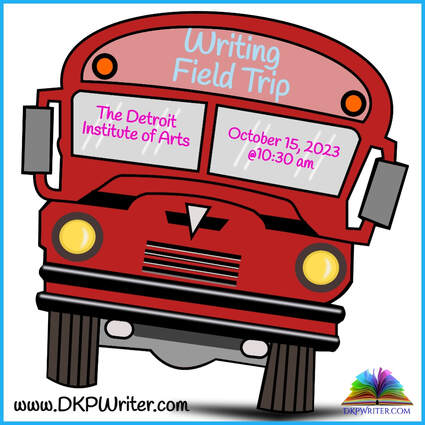 If you're a writer, you've experienced it… writer’s block. That creative rut you get into and can’t seem to find a way to shake it. That feeling can be oppressive and hold you back from telling the stories you know live inside you. We don’t always know where it comes from, why it persists, and most frustratingly, how to eject it. I’ve been there… it can be difficult to overcome. However, I can sometimes work through the blockage if I change something about my writing practice. The change doesn’t have to be big, sometimes the little things make all the difference. But sometimes, if you make several small changes simultaneously, you can see remarkable results. I primarily write on a computer – my fingers are comfortable on a keyboard. I usually write at my desk, with the same chair and same noises surrounding my writing space. Usually, I’m wonderfully productive. But every so often, I like to take myself to write in a different place, with different noises, and different furniture. I’ve been doing this for quite some time, so I shouldn’t be surprised by the results – but somehow – I still am, pleasantly so. Today’s field trip took me to The Detroit Institute of Arts. I’ve enjoyed this place since I was a youngster, visiting with my family, on school trips, and later, on dates or with out-of-town guests. Visiting places of our childhood with adult eyes can sometimes show us new perspectives and build new relationships with friends and the creative process. Today, my friends, Raine and Tandi, came along to share the experience. We had a fantastic time walking through the halls of exhibits, soaking up the inspiration shared from the masters, chatting, and generally reminding ourselves why we do this thing we love – it’s fun. We didn’t go with a specific itinerary or a timetable. We decided where to stop as we walked along, and when we found a place that spoke to us, we sat, set the timer for fifteen minutes, and wrote. For me, writing field trips mean writing longhand, on paper. I don’t like the idea of dragging around alternate power supplies to power the laptop or tablet, and I’m never sure if I’ll have a place to plug in… so old school writing seems to make the most sense. I always bring along a small box of colored pens… I use a new pen for each new writing session. There’s something about the change not only in environment, but also the change in ink color that helps Drake to think outside the pond. Altogether, the three of us got in eight, fifteen-minute writing sessions. I produced about twelve pages of hand-written plot moments for my NaNoWriMo project next month. We were surrounded by paintings, sculpture, armor, and writing from a collection of hundreds and thousands of years of history. It was interesting to me to see how Drake's imagination was influenced and changed in each new room. We walked around the museum and looked at other exhibits, and spent some nice time in conversation, as well. Aside from spending the day doing what I love with good friends, there were two highlights of the day for me. The first was lunch. My favorite comfort food is macaroni and cheese, and the DIA makes a plate of cheesy goodness that is extraordinary – and not over-priced. The interesting conversation the three of us shared during the meal made it that much better. I enjoyed talking with these women, learning more about them, and sharing a bit of laughter, too. The second highlight was an unexpected encounter we had in one of the galleries. There we were, sitting together on a bench in a room filled with exquisite paintings. There were others walking around us, enjoying the art, as well. Sharing space, but not necessarily conversation when in the middle of a creative quest, is part of why writing field trips work so well. The additional energy is the fuel Drake and I don’t always know we’re missing. Suddenly, we heard an intense voice on a loudspeaker… “Warning, you have come too close to an exhibit.” Evidently, the DIA has proximity alarms on the artwork hanging on the walls. I had no idea, it had never occurred to me, although in hindsight, it makes sense. As cool as that was, though… a stern, disembodied voice chastising a visitor who got too close, was what came next. A woman looked at her young daughter and explained the warning voice in a calm and gentle tone. “It’s okay, that was just the museum God letting Daddy know he got too close to the painting.” Raine, Tandi, and I laughed… and so did others within earshot of Mom's explanation. Mom didn’t flinch, didn’t over-animate… the entire exchange was simple, gentle, and almost nonchalant. It was a fun moment we carried with us through the rest of the day. If you have a chance to change up your writing practice, I highly recommend a Writing Field Trip. They can be extremely productive, and you never know what fun moments will make a day of writing more impactful to your WIP than you imagined. My most memorable moments are in the photo gallery below.
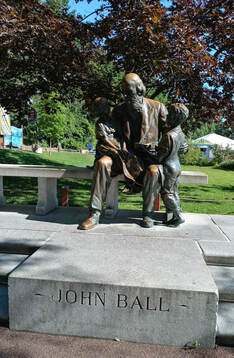 Writing Field Trips, as I've eluded to in past posts, are something I truly enjoy. I spend an entire day exploring my writing in a different environment aside from the same old desk in front of a window with the same old view. Yesterday, I went on an adventure to the John Ball Zoo in Grand Rapids, Michigan and was delighted with the outcome. Sitting in the open air, moving from sunshine to shade, and writing long-hand (not my normal modality) stretches my writing muscles and Drake's creative flippers. The added curiosity of wild animals surrounding us, feeds that process in exciting ways. I came away with some new writing (a very little snippet is shared below) and the distinct impression that one of the main reasons adults have children is to give them an excuse to go to the zoo. I saw so many infants and toddlers yesterday! The day was filled with laughter and smiles, shrieks of joy, and excitement as humans and animals interacted together. This is by far one of the most unique zoos I have visited. My "home" zoo, the Detroit Zoo, has made many important changes and integrations into the animal's habitats over my nearly six decades, and it's a wonderful place that I visit often... but at the end of the day, it's still too much concrete and too few trees to convince my imagination that I'm standing amongst wild animals as they would be found out in the natural world. Not so, the John Ball Zoo. When they designed this park, they certainly took into account the environment and sustained its amazing beauty while also showcasing the animals in a way that encourages imagination.  In my youth, I remember zoos filled with cages of animals. Now, those stark reminders of captivity are all but washed away. Only in some instances, like with the big cats, was there a reminder that the animals were actually prisoners. Even then, the fencing was dark black, and lost in the lush forest foliage. Of course, there are moats and other natural barriers to keep people from making poor choices... but the subtly of control to protect the animals was delightfully enhanced in natural ways like a forest filled with huge, mature trees... well over one hundred years old, I would guess... and wooded planked walkways that erased the concrete jungle that lingered just outside the gates. I am a supporter of accredited zoos and aquariums. I think they play an important role in animal conservation and education. I would still prefer the animals could live naturally free in all cases... but sometimes humanity isn't that selfless. An article for a future day - or not. Writing inside this environment of wild sights and sounds is an amazing treat. As I moved around the zoo, I stopped at each animal's habitat, quietly said hello, and watched them for a little while, allowing my fascination of these incredible creatures to converse with Drake, as they imparted their creative energy to him. He skillfully translated that energy into our storytelling. I spent about twenty minutes (sometimes more) with each, soaking up the strength of their centuries on the planet... or at least a little bit of that energy... and transferred it to the page. One of the best features about the John Ball Zoo is that they sprinkle benches and picnic tables throughout the grounds, tucked underneath the cool shade of their magnificent trees. This practice makes the zoo very attractive for writing. There is always a space to sit and contemplate while watching one creature or another go about their daily lives. I imagine they are as interested in people watching as we are in animal watching... at least I'd like to think that's true. A few of the animals who made a distinct impression were these:
Without question, aside from Ducks, Chimpanzees are my favorite animal on the planet. No matter what zoo I visit, this is always where I spend the longest part of my day. I find them to be extraordinary in movement and emotion, nearly matching humanity. The scientists say they share 98% of our DNA... but I think that those 2% make a tremendous difference, to the benefit of the Chimpanzees. They worked well together in a group during snack time, and were equally comfortable contemplating the significance of the world in sun and in shade. During their one o'clock lunch, I watched as each shared their very distinct personalities to get the keeper's attention and throw down their favorite foods; and they clearly had favorites. I spent about two hours watching these wonderful animals sleep, play, lounge, eat, and climb. This troupe ranged in age from the "baby" at twenty-five years old to the matriarch at forty-five years old. They fascinate me with their complexity. And yes, we actually wrote, too! The piece Drake and I worked on yesterday was for a new novel, a fractured fairy tale. It's called The Trial of Snow White, and is an extension of a short story Drake dictated to me some time ago, Grumpy's Testimony. The story was included in Drake's first book, A Duck Quacks. Drake would like to see the story become a full novel, as would a few of his readers. So, we've been playing with the idea on our field trips this year. While sitting at the bottom of the waterfall, we wrote a small snippet about the King and Queen's castle. Of course, this book is still VERY new and VERY not even close to done... we're hoping to finish it for a release next summer... but Drake said he wanted to share a teeny tiny bit of it with everyone; so here it is, with apologies that the videos aren't longer. It really was quite a magnificent waterfall, and an extraordinary writing spot.
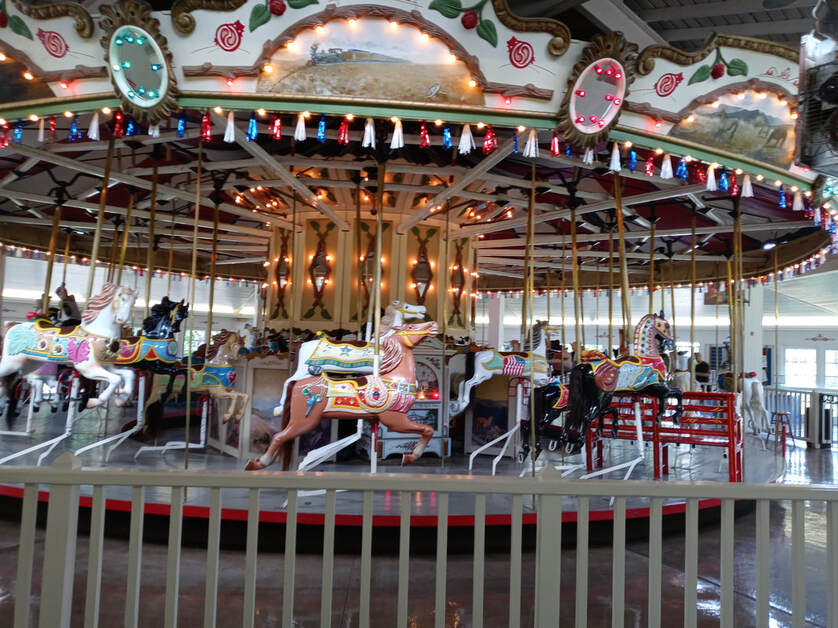 Every writer I’ve ever met is specifically talented. Each has a storytelling gift they generously share with readers. Although none of us ever do it according to the same formula, the final results are equally extraordinary. Like the horses on a carousel, we all travel in the same circles, headed in the same direction (publication), but we travel up and down, speed up and slow down, at our own individual pace, listening to our own internal storytelling song. Each writer approaches their craft in different ways… plotter, hybrid, pantser, discovery writer… we’ve repeated that conversation to the brink of nausea… and yet, somehow, it never grows old. We still find great delight in laughing about where the line is drawn and talking about our process. I’ve found the same is true of how each of us approaches research. Writers either become fully engaged, physically hands-on, sending speeding volleys of questions to museum docents and tour guides, as they hold their breath on deep-dives for their research… or they dig their noses into stacks of books, follow winding and dizzying Internet rabbit holes, and float gently among the pages of tiny little factoid details, filtering out just the right ones to use in a novel. Of course, there are varying degrees of each, and some research processes intermingle. Writers have rules, sure. But mostly we just make it up as we go along. It’s kind of in the job description. For me, the level of enthusiasm I have for research is dependent on a few things; access to real materials and living sources, my interest in the minutia of a particular subject or brand of people, and the weather. When I was a teenager, the library’s old card catalogue was a treasure hunt. As I grew into adulthood, a trip to a museum or re-enactor camp became time travel. 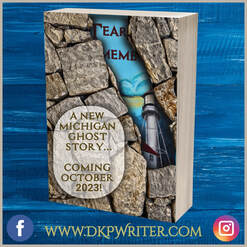 The only time I’ve written a book with scenes focused on the specific details about long winter’s nights, avalanches, the horror of ferocious winds that pelt defenseless humans with armor-piercing sleet, falling into ice-crusted waters and drowning, the almost-instant, slow-motion act of suffocating from the effect of frozen lungs, is with my forthcoming paranormal novel, Tears Remember. This makes sense. It’s a ghost story, set at a lighthouse in Michigan’s Upper Peninsula, in late autumn. These weather conditions seemed like a good environment for a ghost story… after all, only dead people would choose to cling to a place so brutal, right? Still, aside from a visit to the actual lighthouse and about two hours of grilling the docent, the research I did for this book was almost entirely done while sitting in a warm room, staring at a screen, or reading a book that imparted this wisdom of the weather to me, indirectly, so I could then add it to the plot. I haven’t voluntarily sought out more than two inches of snow since I was about fifteen years old, and don’t plan to start again now. [Sign Up To Be An ARC Reader HERE.] 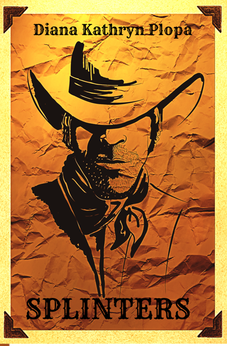 However, other genres invite my inquisitive nature with a presence that requires not only intelligently gathering facts, but also the rest of my senses, too. For Splinters, the western novel I’ve been working on for a few years (with designs to finish it by year’s end), sometimes, it’s more impactful to visit places, talk with people, touch stone and wood, and engage in personal experiences to create richer scenes and the tactile details of a story’s setting. My mind can’t fathom the trials of living in the old west during wintertime, so yes, this book is set in summer. Yesterday, I visited Crossroads Village and the Huckleberry Railroad, on a delightful research excursion. 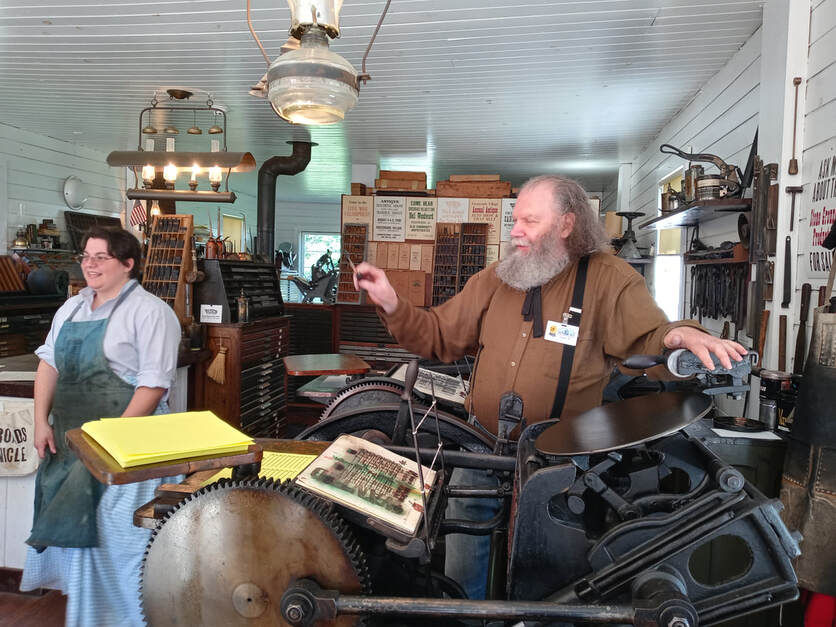 Did you know that in the 1860s, one of the main ingredients in printer’s ink was soot, collected from the under sides of the caps on gas or coal streetlamps by a child, usually an orphan of about eight or ten years old, apprenticed to the printer, in return for room and board, who was called a Printer’s Devil? True story. Did you know that the steel galley forms printers used to typeset just two pages of a four-page newspaper took twenty hours to set? Each letter had to be set backwards, and in reverse order. The letters were made primarily out of lead (sometimes wood), and when it was ready to run through the press, that galley form weighed seventy-five pounds! Did you also know that the printing presses were manually operated – rarely, steam turbines helped – and printers, because of a propensity for lead poisoning, lived only to their early 50s? 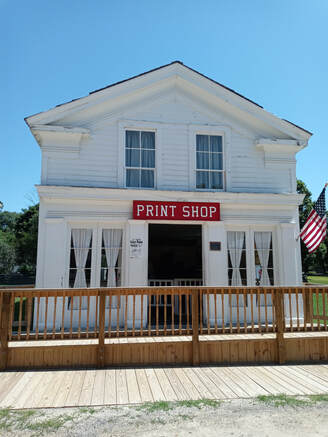 The print room has an odd sulfur odor to it, mingled with the aroma of goopy ink and the old vanilla scent of aged paper. It was tedious, detail-focused, physical work. Were you aware that printers were also reporters? They spent time gathering each story, writing it, and then typesetting the paper, printing and selling it. Printers literally lived submerged in the written word. Newspapers were published when there was news, usually monthly; although less frequently in winter… no surprise there. There is an echo just outside the print shop. It comes from the sound of hard boots striking the wood-planked sidewalks down main street. Like docks in a marina, these wooden walkways kept feet and dress hems out of the rain and mud; or at least, that was the intent. Not far off, I heard the bell and the whistle from the train as it stopped at the depot, a few doors down, dropping off visitors and perhaps new neighbors, coming to settle and make a life for themselves and their families. Steam chuffs through the stack on the engine like the contented sound made by a tiger as it surveys its land, pleased that there is plenty of sustenance to fend off winter nights. This was my first introduction to this town… an exciting train ride that separated me from the modern world and inserted me back in time… to refocus my perspective on life and living. 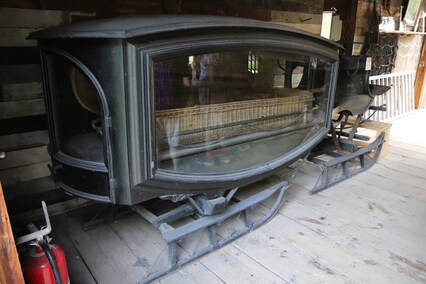 Around the corner is the small doctor’s office where, a nurse tells me, if a man wanted a divorce from his wife, he simply took her to the local physician who administered a test that comprised an unsolvable glass puzzle. Think monkey fist in a bottle. Because she was unable to solve it, she would be quickly diagnosed to have some sort of dementia or neurosis and she was sent to the nearest sanitarium. Her husband would then be free to marry another woman and deny his original wife any money or property to save herself. Few women subjected to this treatment ever repaired their lives. I spoke with the man at the tack and hearse shop, who was just as baffled as I was at the reasons behind why the cast iron sled hearse (used in wintertime) had windows on all sides, from which you could get a clear view of the casket. The better to verify the dead body was actually dead, perhaps? Oh, and the man who crafted these hearses… in the off-season (is there an off-season for death?), he tinkered with tin, making Christmas decorations for the town, and toys for the children. Now that’s career cross-pollination if I’ve ever heard it! This space had a distinctive barn-dust covering all the leather saddles and bridles, and the aroma of soot and wicker (from the caskets) competed for my attention. Again, the loud clomp, clomp of boots on wood-planked floors echoed through the room’s high ceiling. 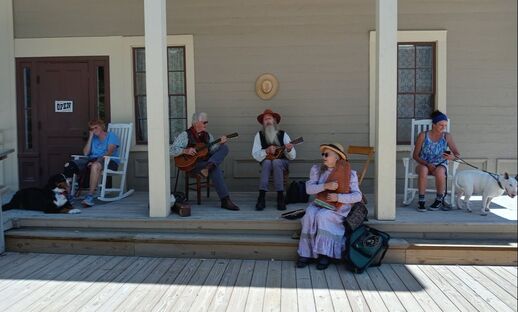 As I walked through this tiny town, I got a real sense of community. I could easily imagine the dirt streets filled with horse-drawn buckboards. I could see the women in their long gingham dresses, layered with white aprons walking from the dry goods store back to their homes, carrying baskets of supplies, talking affably about what dishes they would share at the town Matriarch’s birthday party that coming Sunday, or how their youngest was teething, keeping the entire household awake some nights. The joy I find in hands-on research for my writing projects is akin to riding a wooden horse on the outside circle of a hundred-year-old carousel. It invigorates my senses in ways I haven’t felt since childhood. The pure excitement of that tactile experience makes me sigh in reflection, stirs the fire of my inquisitive nature, and makes me giggle from the exhilaration of the overload of sights, sounds, smells, and vibrations running through my mind, body, and soul. This is how I most enjoy writing research; becoming fully immersed in the moments, pulling myself away from reality, but still able to recall all the tiniest memories when sitting at my desk. 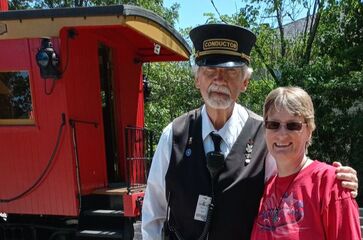 However, just like that carousel ride, the time passes by much too quickly. I’m grateful for people like my new friend, Walt, who keeps those memories alive and is enthusiastic about sharing them with me and the others who visit. For each moment I spend in tactile research, my writing is more accurate and joy-filled. It is my hope that those sensations reach my readers, too. 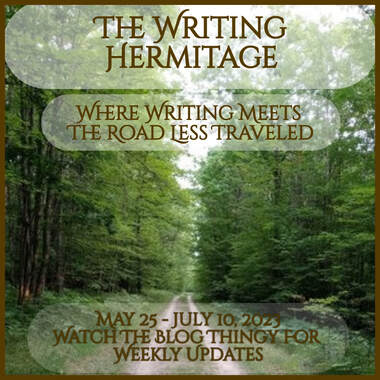 If you ask anyone who knows me, you’ll discover that I am a HUGE advocate of Writing Communities, and I’m overly vocal about it. I have experienced the wonderment time and again of the exchange of creative energy when writers gather in a shared space to write. The cooperation of an “of course I can” mindset, mixed with the comfort of knowing that friends are nearby whenever I need help with character conundrums, plot problems, or ferreting out the frustrations of timelines, is priceless. It is because of my supportive, kind, and loving writing tribe that I can set and achieve tremendous writing goals. There is also a lot to be said for the momentum writing in solitude can bring to a project. The two approaches to creative storytelling are not mutually exclusive. Both have merit as a regular part of my writing practice. Just as Julia Cameron advocates for “morning pages…” and that doesn’t always work for me… so too is the comparison of writing in community and writing in solitude. Both allow Drake to do what he does best without ignoring either pond completely. Sometimes, I need the energy of many other writers nearby to fuel my imagination. Sometimes, I need to escape to a place where it is just Drake and me, diving deep into our work without distractions, at our own pace. Each year, I indulge in a solo Writing Hermitage to focus on getting my books either written or edited. My desktop is usually filled with several projects simultaneously… each living in various states of “done.” Like NaNoWriMo, where the focus is on writing a rough draft for a new project, my Writing Hermitage is focused time to complete one or two projects without the pressure of city life, expectations of my editorial clients, and social media rabbit holes. I love all those other things, but they often interfere with the plain attention required to get the writing done. As the saying goes, writing novels requires that you put your “butt in the chair and your fingers on the keyboard” consistently. Usually, I go away for a month and immerse myself in the world of words. This year, I’ll be away for about six weeks simply because two holidays – Memorial Day and Independence Day – fall during my writing time… and anytime there’s a holiday, it means at least a week lost to other indulgent pursuits like fireworks, music festivals, outdoor theatre, or excessive kayaking and hiking. So, this year, I’m going early and coming back late. As I prepare to venture into my time submerged in story, I’m thinking about how I plot my expectations and manage my time while I’m there. I’ve done this enough, so now I feel like I have a routine that works for me. You may find this helpful or not. Either way, I hope you’ll think about incorporating a Writing Hermitage in whatever way fits your practice. 1. The goal is to write. But don’t be Machiavellian about it. After all, if you have to be sneaky about getting yourself to write, perhaps you should take up another hobby. Be honest about your word counts and editorial goals. Don’t add ridiculous pressure by starting your time away by distrusting your ability to write in solitude. Don’t be manipulative about getting it done. This should be a time of GENTLE focus and floating in the seas what you love. The idea of carrot and stick doesn’t apply here. Sure, you have goals, and you’d like to achieve them, but no one will come at you with a cat o’ nine tales or take away next year’s trip if you fall short of those goals. This is a time for writing focus and renewal. So, leave the stick at home and bring as many carrots (and chocolate) as possible. If there was ever a time to acknowledge the value of the “participation trophy,” a Writing Hermitage definitely qualifies. 2. Go somewhere you love. My writing sanctuary is a tiny, 340sqft log cabin in the middle of twenty acres of forest. I’ve got a hammock, a comfy bed, protection from the bears and coyotes (with the option to maybe see them in their natural habitat once in a while), and, if I’m interested in doing the work, a campfire every night. When it rains, I’m comforted by the symphony played upon branches filled with leaves and nature’s reminder that powerful possibility is just as accessible to me as it is to anyone else. My space is at least a twenty-minute drive from a civilized town, and by civilized, I mean somewhere with either Mcdonald's or Subway. This might not be your ideal space… you may need room service and a hot tub. For me, slipping into the folds of nature allows me the comfort and freedom to create without traffic circle navigation (I’m not a fan) and the constant sounds and light from thousands of people reminding me they exist. At night, the dense blanket of darkness and the absolute stillness of the world around me gentles my brain and calms my anxiety about missing my daily word counts. Tomorrow is another day of opportunity, creativity, joy, and peace. 3. Don’t skimp on food. The Writing Hermitage is an exercise in indulgence, not punishment. The Writing Hermitage is not the time to go on a diet. Eat what you love… easy-to-prepare meals, and special tastes that make you happy. If you’re doing your Hermitage in the city, then perhaps that means calling up room service and placing an order for perpetual mini-bar restocking. For me, the simple culinary pleasures I can make without an oven and electricity are best (I use a two-burner propane camp stove and BBQ grill). I love quick-to-build salads, grilled ham & cheese sandwiches, shrimp scampi, fettuccine alfredo with chicken or shrimp, BBQ chicken, and venison steak, corn on the cob, and lots of baby carrots (I think I mentioned that already). I am vigilant when it comes to my hot cocoa supply, as well as keeping cheese, crackers, and chocolate snacks well-stocked. I eat when I’m hungry and don’t when I’m not. I let Drake decide on the meal plan. I’ve got plotting to do. 4. Step away from the writing desk occasionally to recharge your brain and give your Muse a break. Sure, the Writing Hermitage is designed to put your creative production front and center, but we all know that nothing good ever comes from force. So, take a couple of hours to check out that museum around the corner. Visit the local library and inhale inspiration from the stacks. Go hike along the river, kayak your favorite lake with your tiny dog, sit quietly at night and watch the sunset. Or, read a book for a couple hours before bedtime. This is a time for your creativity to soak up all the positive influence possible, so allow yourself to revel in tiny moments of peaceful joy occasionally. Then, remember to write those aftershocks of happiness into your stories. 5. Don’t ghost your need for companionship. This never works out well. Of course, the focus during your Writing Hermitage should be on writing. However, when you feel lonely, phone a friend, post a photo to social media, or go grocery shopping and talk with strangers about the weather. Just because I spend concentrated time focusing on my writing, that doesn't mean I’ve magically transformed myself into a hermit. I’m not swearing off the infusion of outside contact; I’m simply less gregarious about it. Writing isn’t punishment. So, if you need to reach out to someone while you’re away to remind yourself that your circle will still surround you when you return, do that. A shared few moments of laughter with a friend, scattered between hours of coagulating scenes into chapters, is healthy… for you and your book. 6. When it’s all over, celebrate your accomplishments. Take inventory of all you’ve created and the excitement of moving your project to the next level. Avoid chastising yourself if your word counts don’t match the arbitrary rule you made at the beginning. Any forward movement on a creative project is positive. And if it turns out that all you did while you were on your Writing Hermitage was spend time being with yourself, staring at the stars, interviewing your Muse, sitting in peace, finding joy in the contemplation of where your project will go next, or what new project you might concoct… well, that’s a valid use of this time, too. Celebrate. As with the accomplishment, there is always courage to be celebrated in the attempt. Then, take up your calendar and plan your next Writing Hermitage.  Since first becoming an Indie Author in 2010, I’ve focused on not only building my writing career, but I’ve also worked to share the creative wonderment of my Author Friends. I hope that they will choose to do the same. I never expect it, but it is Nice when it happens. This idea of Reciprocity truly is the easiest thing to build into an Indie Author’s Marketing Plan. In common use, we understand Reciprocity to mean “You give, I gain; I give, you gain.” When we do things in celebration of our Friends, the impulse is for our Friends to celebrate us in return. It harkens back to that old “Golden Rule” thing. It is a moral most of us were taught in our childhood, or at least some version of it… “Do unto others as you would wish they would do unto you.” My grandfather simplified it to the two-word command: “Be Nice.” When I looked up Reciprocity in the dictionary, I found nine different interpretations of its meaning. In my first surprise of the 2023 New Year, I was drawn to the ninth definition. It is a mathematical use for the term, and I was quite taken by it. I’m usually extremely allergic to math. But this particular definition spoke to me for its specificity. “The ratio of unity to a given quantity or expression; that by which the given quantity or expression is multiplied to produce unity.” ~Dictionary.com The idea of Unity being multiplied out of giving a quantity of something or by the expression of it, is phenomenal. When I considered this idea of Unity as I thought about the Indie Author community, it made complete sense to me. Think about it… we are all searching for a way to expand our reach and sell more books. Simultaneously, we have a strong desire to find a commonality within our community that lends support emotionally, intellectually, and financially. If we apply the mathematical definition of Reciprocity as a story problem (because, let’s face it, stories are what we do), this is the answer I've come to: Unity can be best created within our community when we multiply our willingness to give our spotlight to another Indie Author for a brief time. What an extraordinarily exceptional concept! By simply sharing what we love about our Author Friends, we accomplish three mutual goals... 1. We help to promote our Friends and ascribe respectful meaning to their life's ambitions. 2. We help to promote our creativity by comparing it to the wonderment of our Friends’ work. 3. We create Unity and strength within our community simply because we’re being Nice. The simplicity of Reciprocity is so seductive. Frankly, I’m astonished to see so many Indie Authors avoiding or neglecting it. It just doesn’t make sense to me. Reciprocity is easy. Reciprocity is painless. Reciprocity is innocuous. Reciprocity is inexpensive. Reciprocity is patient. Reciprocity is emotionally intelligent. I have two theories that could explain why more Indie Authors aren’t taking an opportunity to expand their writing careers by being regularly Reciprocal. Either… 1. An Indie Author is generally ego-centric, and they don’t want to put forth the effort it takes to do something that doesn’t directly, instantly benefit them. Or… 2. Indie Authors don’t know how to be Reciprocal. They truly don’t know what specific steps they can take to encourage Reciprocity with their Author Friends. If you’re an Indie Author who fits into the first hypothesis, well, there’s not much I can say except… I wish you well in all your writing endeavors and I sincerely hope your career attains the vision you have for success. If you are an Indie Author who fits into the second theory, or perhaps you’re planning to change your approach, you may find some of the following suggestions helpful. One very important thing to remember is that Reciprocity requires consistent attention. Although you may be able to “set it,” you shouldn’t ever “forget it” if you hope to see positive results for both you and your Author Friends. WHY SHOULD YOU BE RECIPROCAL? LET'S USE SOCIAL MEDIA AS AN EXAMPLE. Yup, most of us participate on one type of social media platform or another. Some of us are deeply embroiled in more than one… some of us just dance around in a few, randomly poking in and out. No matter the frequency, the associations we affirm in this very public space is how we train others to define us. Everything you post teaches people about you and your values. Each digital piece of art or phrase remains accessible forever. They become like Sharpie permanent markers upon our subconscious’ whiteboard. Once you put something out there, it never disappears (not even if you think you’ve deleted it). It’s forever floating around in the grey matter of decision makers. What you put out there may be overlooked or sometimes pushed aside, but it never actually goes away. It’ll reappear in the form of a “tip of the tongue” memory, at some point. Of course, we’re all going to use Social Media as a self-promotion platform some of the time, and we should. Strangers can’t discover us or our work if we don’t tell them who we are and what we create. No one will toot our own horn louder, longer, or with nearly as much passion as we will. Social Media is an incredible tool for that purpose. But it is also a powerful influencer that you can use to help others discover your Indie Author Friends as more than a passing curiosity. When you share a post directly from your Author Friend’s feed, you’re creating a “stereo” introduction. First, you’re introducing yourself to the people inside your Author Friend’s circles. You’re saying, “Hey, nice to meet you. This person and I share the same opinion/value/humor.” You’re establishing a connection to someone they already trust, and you hope that trust will trickle down (eventually) to you and your career, simply by association. Second, you’re also standing up inside your circle of Friends and proclaiming, “Hey you guys, check out this really nifty person and what they have to share. I think you’ll be happy to meet them.” Likewise, your Friends will come to trust the person you introduced to them simply because they already trust you. Now, if you post something that is altruistic – something that intends to only promote another Author, without bringing you or your work into the post at all – you’re telling everyone that you believe in your Author Friend and value their work. People who are looking in from the outside, perhaps for the first time, learn that you’re a Nice person because you’re a supportive Friend. They see that you take time to do something that focuses on someone else. I don’t know about you but seeing that makes me want to get to know those people more. When given the option to follow a self-absorbed luminary through the dank, dark, uncertain literary forest, or walk side by side with a Friend who will be there to cheer me on, wouldn’t you rather walk with the Friend? I know I would. The end result? People come to trust you through your associations with those they already trust, and through that process, they will come to take a risk with someone new because you’ve recommended them to the world. It costs you nothing. It gives you strength in your reputation and helps build Unity and integrity within the Indie Author community. OKAY... SO, HOW CAN YOU BE RECIPROCAL? Below is a list of five things you can do that cost you nothing or very little to build Reciprocity into your marketing plan. Remember, if you notice that your Author Friends are doing some of these things for you, return the kindness. That’s the point. 1. Social Media… I’ll avoid the temptation to be bombastic, and just assume you get it. 2. Newsletters… At the bottom of your newsletter, consider recommending a book or two, written by an Author Friend, and include a link to the Author’s website. It’s especially Nice, if you know an Author Friend is publishing a new book soon, so you can include that teaser. Perhaps with your help, the Author will see a surge in first-day sales. This costs you nothing; you were sending out your newsletter, anyway. 3. Book Reviews… This suggestion is redundant to the point of nausea. Just… Put them everywhere. You’re probably reading books anyway, right? Why not share a few positive thoughts and help a fellow Author in the process. Put them in your blog. Put them on Amazon and Goodreads. Share them on Social Media. Add them to the content of your Newsletter. If you’re looking for extra content for your podcast, book reviews make a great “intermission” between major segments. Your review doesn’t have to be poetic or terribly long. Say something Nice and watch how the world changes. It costs you nothing except a few minutes of your time, but it helps another Author more than you will ever realize. 4. Book Comparisons… Let’s suppose you’re sharing your books at a local fair or festival. If you have an Author Friend who writes in the same genre (and also has a booth at the event), make a comparison between your books, and throw it out into the world – along with directions to their booth. For example, “Thank you for buying my book. If you enjoy short stories and you’re also interested in something with a little more suspense than A Duck Quacks, check out Andrew Allen Smith’s A Slice of Fear series. You can find him right over there – yup, he’s the super-happy, very tall guy.” Or “I appreciate that you bought my novel, A Tryst of Fate. It’s a thoughtful romance with a sprinkle of mystery. It you also enjoy super twisty mysteries with a bit more steam, try Mark Love’s Fleeing Beauty. He’s wonderful. His booth is three down that way, on the right.” Keep in mind that making recommendations to readers in support of your Author Friends is a Nice thing to do when visitors to your booth aren’t interested in what you have to offer. You weren’t going to make a sale anyway, so why not support your Author Friends? Want to go one better? Exchange a few bookmarks with your Author Friends at the beginning of the day and offer them to visitors at your booth. Not only will it reinforce your kind gesture of helping a reader find more fun books, but you’ll also support your Author Friends with a reminder for those visitors who didn’t have time to stop by their booth, to check them out online when they get home. Remember, your books are not exactly like my books, even if we write in the same genre. We are not competitors, we are colleagues. Being Nice doesn’t eliminate sales. Being Nice enhances sales. 5. A Referral Page On Your Website… Have you ever wondered how you could possibly be Nice to ALL of the Author Friends in your life? Why not make a list? It is easy to add a page to your website that links your fan base with your Author Friends. You could have tons of fun and add graphics of their book covers, or their logos… but you don’t have to go too overboard with it, you can keep it simple. You can make your list alphabetically or maybe by genre. Just list the names and either link them out to the Author’s website or type out the URL to make it easy to copy and paste. And… if you keep a list like this on your website, you’ll be reminding yourself, too, about the people with whom you are Reciprocal. If ever you’re at a loss for a Social Media post or a book review to write, just go to your website and check your list. If you don’t have back-end design access to your website, or don’t know how to do all that magical digital stuff, this new page might cost you a little bit to have your web master build. But it shouldn’t be excessive. The small fee to have this added to your website is worth every bit of Unity and support it creates for the Indie Author community. Bonus... Every time you add new content to your website, even if it’s just one name and the URL of another Author Friend, the web spiders perk up to your changes, and make your website interesting to other web spiders. This creates relevancy for your brand and will keep you nearer to the top of search engines. And... If there’s Reciprocity… it makes even more bored web spiders sit up and take notice, and everyone benefits. Now, is it critical that you do ALL of these things, ALL the time? No, of course not. We all know that marketing is important, but it can’t overshadow the prerequisite of writing books. But it’s easy enough to build some of these things into your marketing plan. Sprinkle them in once a month or so. Remember, consistency is the goal. Anything that’s done “flash in the pan” extinguishes it’s flame quickly. Your goal should be to nurture the warm, red glow of a slow burn when it comes to Reciprocity. Take some time, over time, and make it part of your regular routine. ONE MORE THOUGHT... By definition, Reciprocity is a practice that requires at least two people who are engaged in the process to make it work. Like a teeter-totter, if all the weight is on just one side, there is an unbalance and Unity will never be achieved. If that happens, then our writing careers are no better off than the life of the Pacific Salmon, swimming upstream, doing our best to survive, but knowing death is inevitable. How many of us, given the option, will continue that lonely, frustrating route? Personally, I think it’s far more fun to be a dolphin, playing happily with all my Author Friends, in the warm waters of creation and Reciprocal success… Enjoying the Nice.  I read on one of the many writing group forums today, a novice author expressing their gratitude for someone pointing them in the direction of programs like Grammarly and Pro Writing Aid. They extolled the virtues of these software programs, proclaiming that now, their work would be “more professional.” Learning about these tools made them feel confident they were ready to take their book to press. I say, “Yay!” How fantastic that someone’s creative spirit and confidence was lifted by the kindness of another and their suggestion to make an oft-times frustrating road a little less so. And… (a mentor once suggested that I replace the word ‘but’ with ‘and’ whenever I want to build on a statement, rather than detract from it). While these tools are a huge boon to the newly initiated and experienced writer, they should not replace the wisdom offered by a professional editor. There, I said it. It’s harsh, perhaps, but (and) tools are not enough. While good tools certainly make the job easier, they don’t replace real, practical knowledge. Okay, let me try it this way… When I was a kid, I grew a few inches during the school year, and by the time summer rolled around, the seat on my bicycle was too low. I needed to raise the seat, so I could effectively pedal without slamming my knees into the handlebars, which would throw me off balance and make me fall over. I asked my older brother how to do this, and his answer was simple. “Just grab a wrench and loosen the bolt. Then pull up the seat to where you want it and tighten the bolt again. Easy.” He gave me the correct instructions and even told me which tool to use. So now, I was prepared to go out to the garage and make my bike “work” for me again, right? Nope. I knew I needed a wrench yet had no clue which one to use. And, when I looked more closely at the seat, there were two bolts, not just one, and I wasn’t clear on the consequences of choosing the wrong bolt. Frustration washed over me as I stared from the open toolbox to the bike and back again. Tears began to fall down my cheeks as I quickly realized that I couldn’t do this one simple thing with enough success to ensure I wouldn’t fall flat on my face the next time I put sneaker to pedal. Yet, from somewhere deep inside, I pulled myself together. I convinced myself I could figure this out if I just spent a little time exploring the problem and testing the tools. After all, if my brother, who was only eighteen months older than me, could figure it out, it couldn’t be that difficult, right? Fortunately, I’d spent enough time with tools to know the difference between a wrench, a screwdriver, a hammer, and a pair of wire cutters. So, I had that going for me. I began by separating out everything I knew to be a wrench, leaving the others in the bottom of the toolbox. Step one, done. Breathing a heavy sigh, I looked over what was left: a pile of box combination wrenches, a couple of allen wrenches, and a pile of socket wrenches. Oh, and there was a pipe wrench in there, too. I quickly threw the pipe wrench, and the allen wrenches back in the box. Just like with the three bears and their chairs, these tools were clearly either too big or too small for the job. My confidence grew stronger. Maybe I could figure this out. Now I had a pile of wrenches, all of which I understood how to use… after all, I’d been helping my brother “fix” things around the house for years. I knew how they worked. I knew “righty tighty, lefty loosey” and how to snap on and off the extensions for the socket wrenches. I even knew that if you flipped that little switch on the side of the socket wrench, the ratchet would go in the opposite direction. I wasn’t a complete dolt. But (and) the problem facing me was which wrench to use, and which bolt to turn to raise the seat. It was a conundrum, to be sure. I must have sat there for an hour, agonizing about what to do… testing out different wrenches on each bolt, discovering, with disappointment, that they were two different sizes. That made sense, considering the bolts probably served different purposes. Another confidence-laden sigh escaped me as I realized I’d solved another piece of the puzzle. But the sun was dipping lower on the horizon, and my bike-riding time was fading fast. In the next moment, all confidence was gone, and tears rolled from my face as I sat there in complete exasperation. It’s understandable. I was only eight years old. Losing precious biking time was a tragedy. A few minutes later, my brother came out to the garage and asked me what I was doing. “I’m trying to raise the seat on my bike, just like you said,” I replied through tears and hiccups of frustration. “I know you told me to use a wrench and just loosen the bolt, but I can’t figure out which wrench, and there are two bolts!” By this time, I was lost to my agony, doubting my ability to do anything right. “I can’t do it right. I’ll never ride my bike again!” Yup, the melodrama of an eight-year-old is a real thing when faced with a tragedy. As you might have guessed, my brother was equal parts amused and furious with me. “You’re a dolt,” he said, crossing his arms over his chest. And then he said the wisest, kindest thing he’d ever said to me in our eight very short years together. “You should have come back inside and asked me to help you. If you’d done that, you could have been riding your bike all this time instead of sitting in the garage crying. You can’t be expected to know everything… so you have to remember to ask for help to get it right.” Then he picked up the 7/16” socket wrench and loosened the bolt under the seat. This made the seat go up. Then, he used the adjustable wrench I’d missed from my sorting session and loosened the bolt on the side, which tilted the front of the seat slightly to make it easier to climb on. He dropped the tools back in the box and said, “There. Done. Now go ride.” I looked at my brother in awe. He just smiled and walked back into the house without another word. That was the day I learned that tools were great, AND they were basically useless unless you knew how and where to use them to gain the greatest success. The other take-away? It was perfectly okay for me to ask for help if it meant keeping myself from falling flat on my face in pain or humiliation. So yes, editorial tools like Grammarly and Pro Writing Aid can be super-helpful as you work toward getting your manuscript as close to done as possible. Good tools will save you a lot of time and aggravation. AND you shouldn’t discount the simple act of asking for help from an editorial professional to improve the quality of your book and keep you from falling on your face. It is well worth spending a little bit of money to save yourself hours of sitting on the floor of your garage overwhelmed with tears of frustration. Dear Friends, I hope this note finds you and your family well and excited about the summer season now upon us. I hope authors continue to be successful in their creation and sales, and I hope readers discover a little something they didn't know existed before, and enjoy the journey of storytelling. 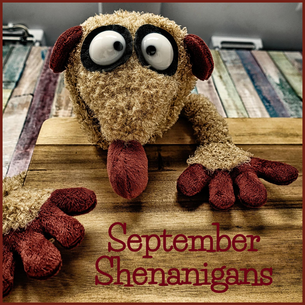 First, some SILLY NEWS! I'm trying to plan a thing... So often, we authors get together at festivals, or at conferences, or zoom meetings and talk about how much fun it would be to just hang out with each other and have a little time to know each other better without the stress of sales pitches, teaching, or learning. Just talking with each other like people might be a fun idea. So, that's the plan. If you're an Indie Author, and you think this is something you might enjoy, please follow the link and let me know your thoughts. On July 5, I'll look over your responses and see if there's enough interest. And, of course, my feeling won't be hurt if you all decide this is not what you want. I live my life on the premise that "You can't say YES if I don't ask the question." :-) http://www.dkpwriter.com/september-shenanigans.html 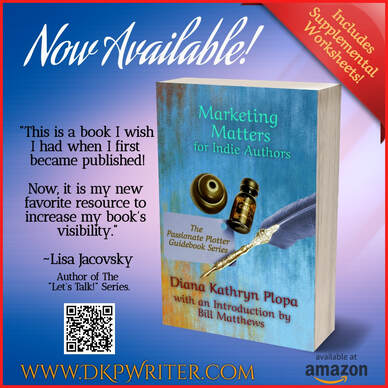 Now for the RELEASE NEWS! I'm excited to announce the release for my new book, Marketing Matters for Indie Authors. This is the first of five books in my new series, the Passionate Plotter Guidebooks. The series is a self-directed writing workshop that helps adult writers along the path to becoming Independently Published Authors. Designed for writers from grade seven thru adult, each book in the series takes the writer on a deep-dive adventure into the five primary stages of the writing journey Written in a highly accessible, casual, and conversational tone, each book in the series includes specific Reflection Prompts with writing space, to help you discover the ideas you didn't know were waiting. As you work through the program, each chapter will enhance your understanding of writing fiction, non-fiction, memoir, and children's books. The Passionate Plotter program provides an engaging and entertaining strategy that will support your publishing goals with practical instruction and step-by-step guidance inside a program you'll want to use again and again. Each book also includes a Special Secret QR Code which leads to the Online Access Portal for all of the Reflection Prompts as Supplemental Worksheets in Microsoft Word, in a fillable format. These worksheets are provided to you to aid in your writing quest, adventure after adventure! The book is available on Amazon at https://www.amazon.com/dp/1628282665?ref_=pe_3052080_397514860 Or you can buy a signed copy from me directly when you visit me at any of the fairs and festivals this year. Visit my website for a list of the events I'll be attending at http://www.dkpwriter.com/ I have also written a children's workshop workbook, The Passionate Plotter Kids, which is intended for children from second thru sixth grade, to discover the wonderment of a writing adventure. You can learn more about that book at http://www.dkpwriter.com/the-passionate-plotter-kids.html 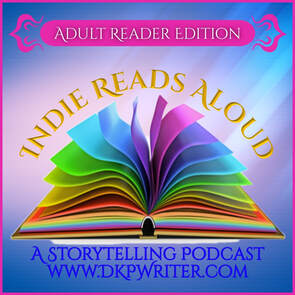 FANTASTIC PODCAST NEWS! As our audience grows, I am expanding the podcast to offer more support for Indie Authored Books! This program is not just for authors anymore! The goal of the podcast is to help Indie Authors share their work with greater reach. To that end, I am now inviting Indie Authors, Illustrators, Adult Fans, and Young Readers to share their favorite Indie Authored books! Indie Reads Aloud Adult Reader Edition: I've heard from listeners that they have discovered a great story written by an Indie Author, and they would love to read a bit of it on the program, as a way to help that author gain more exposure. I think that's a fabulous idea! So now, Indie Authors, Illustrators, and their Adult Fans are all invited to share Indie Authored books on the program... not necessarily written by the Adult Reader, themselves! You can read almost any genre on the podcast... Novels, Poetry, Non-Fiction, How-To, Memoir, Children's Fiction... the works! I know some of you aren't comfortable reading "on the air", but if you've got an adult friend who would love a shot at micro-stardom, this is their chance! This is also a great opportunity for you, as an Indie Author, to share the love, and perhaps read a bit of an author friend's work, to help them reach more readers. Remember, we are all colleagues, not competitors! I am now scheduling recording sessions for late autumn air dates. Find the sign up form for the Indie Reads Aloud podcast on my website. 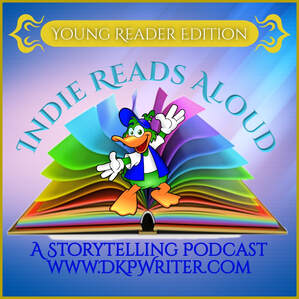 Indie Reads Aloud Young Readers Edition. I am inviting Young Readers to come on the podcast and Read Aloud. Reading is one of the most valuable skills young people can acquire, and I want to support their growth in literacy. Giving Young Readers an opportunity to Read Aloud, and share why they enjoyed a book is a fun way to encourage them to become life-long readers. I know a lot of you Indie Authors are introverts, and you're not tremendously comfortable reading aloud. But, I also know a lot of you have young readers in your lives who are extroverts and would love the opportunity to share their theatrical and reading skills on the podcast to support your writing career. So, this is their chance! Young Readers must be between 10 and 18 years old, and the book they read must be written by an Indie Author. ***One safety note: Young Readers must have a parent or guardian present during the recording session. I am now scheduling recording sessions for late autumn air dates. Find the sign up form for the Indie Reads Aloud podcast on my website. 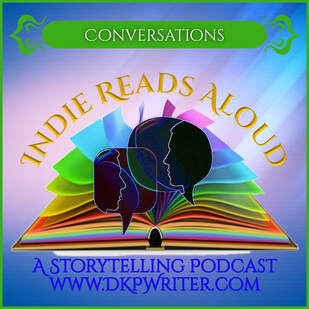 But Wait! There's More!! I'm also adding another layer of fun to the podcast, Indie Reads Aloud Conversations. Sure, I LOVE hearing your stories, but I also enjoy talking with authors and illustrators about their craft. I love hearing about where you get your ideas, how you go about your process, and why you choose the genres you write and illustrate. So, this is my chance to have those discussions, and indulge myself in learning more about you and your process, while having a bit of fun. The idea is to pre-record these sessions, and invite readers to join the conversation, too. Perhaps we'll give away books or other nifty stuff with the Spinny Wheel of Happiness... Perhaps we'll play games, and Read Aloud a little. The program is completely unscripted... so as long as we keep it all family-friendly, we could have a really good time! I'm scheduling recording sessions now, to air in late autumn and into next year. So, if this sounds like fun to you, too... Sign up using this form on my website and join the Conversation! If you've already read aloud on the podcast, join us for Conversations. If you haven't read aloud yet, that's okay, you can start with a Conversation and then Read Aloud on another day! 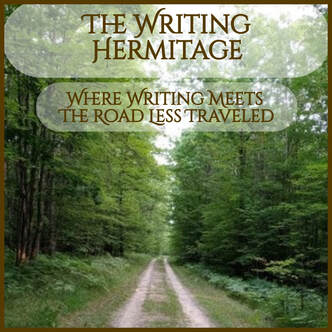 Writing Hermitage 2022! I'll be away at my little cabin in the woods from the middle of July through the middle of August on a Writing Hermitage. This is time I get to devote to almost nothing but writing, and it's glorious! During this year's hermitage, I'll be working on completing three novels... a western (Splinters), a paranormal (Tears Remember), and a suspense (Anonymous). I'll also be spending a bit of time working on the edits for the collaborative novels our community has been writing, helping a few authors edit their books, as well as catching up on my evening reading with my Indie Reads Challenge. I'll be home briefly, at the end of July for the Sterling Fest, and then returning back to the cabin the very next day, for a couple more weeks. I'll check in on Facebook and my Blog Thingy when the Internet cooperates. The cabin is literally in the middle of nowhere, so I make no guarantees on communication, but I'll try. I'm really looking forward to this time of concentrated writing, reading, hiking, and kayaking with Charlie. I'll see you all again in late August. 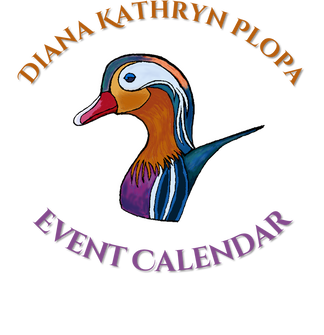 Where To Find Me At Events... Saturday, July 30, 2022; 10:00AM - 4:00PM SterlingFest Local Author Fair 40255 Dodge Park Road Sterling Heights, MI 48313 Friday, August 5, 2022 12PM - Midnight Saturday, August 6, 2022 10AM - Midnight Timberfest - Art on Kneeland Lewiston Chamber of Commerce Park 2946 Kneeland Street Lewiston, MI 49756 Friday, September 9, 2022 12:00PM - 7:00PM Saturday, September 10, 2022 10:00AM - 7:00PM Sunday, September 11, 2022 11AM - 4PM Charlotte Frontier Days Festival Eaton County Fair 1025 Cochran Avenue Charlotte, MI 48813 Sunday, September 18, 2022 10:30 AM - 5:00PM KerryTown BookFest Morris J. Lawrence Building at Washtenaw Community College 4800 E. Huron River Drive Ann Arbor, MI 48105 Thank you for your continued kindness and support, and have a spectacular summer! 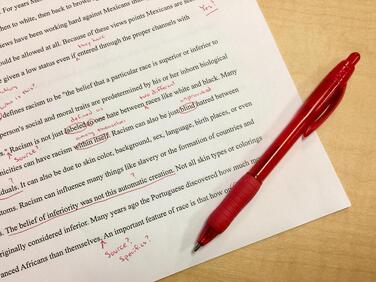 Whether fiction or non-fiction, reading is a preoccupation that requires a suspension of disbelief fostered inside trust. Those who hold books in their hands while curled up in the corner of the couch, studying intently at the library table, or hoping to be ignored on the subway during the evening commute expect excellence between the punctuation marks. They anticipate the reward of education or escapism after a long day’s slog through a frustrating encounter or an insufferable wait. Readers fall in love inside an author’s carefully crafted pages. They battle demons from the netherworld. They become more proficient at a skill, discover alien societies in distant galaxies, or seep into the comfort of places already understood and people already loved. It is our obligation to deliver on the promises of cover art and synopsis. It is a daunting task and a heavy responsibility. It is also a choice. The act of writing, some profess, is a calling. It is a compelling conversation one has with Spirit requiring devoted attention of time, energy, sweat, blood, and tears. Many are driven to write because of an electric surge that prods at us. If we ignore it or somehow smother it, much like the consequence of refusing to inhale… we will die. Yet that is also a choice, albeit one too devastating to argue. Because we decided to write, we must honor the process just as we honor good health. We must take in every piece of advice offered to nourish our craft. We must use every helpful tool we discover to polish our delivery. We need to learn all we can to protect our choice without regret – for ourselves or our readers. It is a foregone conclusion that you will damage your relationship with your DNA by choosing to neglect your body’s essential requirements of life. So too, will you abuse your reputation with readers if you ignore their expectations of a solid story, engaging characters, and sentences that flow easily. Forcing readers to trip over grammar, spelling, continuity, and syntax mistakes may result in an agonizing punch to your writing career. Sadly, you may never recover. Most authors can tell a fantastic story or impart tremendous wisdom while holding a reader’s attention for hours through a solitary, focused effort. Collaboration on the inside pages is not necessary for an author to enjoy success. However, suppose you violate a reader’s trust by allowing your ego to proclaim that your writing is above reproach. In that case, you are inviting a world of hurt that will cascade from one book to the next. Neglecting to connect with a professional editor simply because you ‘write well enough’ is unconscionable. Could you do it all on your own? Perhaps. Should you go it alone? Never. The skills, objectivity, and lack of emotional attachment a professional editor brings to your work are critical. We are far too close to our own stories to make the difficult decisions of which superlative passages to rephrase or which characters to help exit the story, stage left. Only through the guidance of a professional editor can we avoid the plot holes, incongruencies of character, or misinterpreted messages that dissuade people from reading all the way to the back cover. Let alone lending or recommending our book to others. Even the best writers rely on editors. After all, they specialize in putting a sharper edge on the tension, deepening the authenticity of the emotion, and eradicating the oversights made in that fifteenth version we are sure is perfect. Many Indie Authors edit themselves to control expenses and somehow balance the income against the art. It is a trick we play on ourselves to keep from falling headlong into a melting pint of ice cream and despair. It’s completely understandable. Retaining control of the budget validates all the long nights learning the multitude of steps involved in birthing your book on your own. Find another area to skimp on as you develop your emotional and financial budget for your next writing project. Don’t snub the expertise of a reliable, knowledgeable editor just to save a few dollars. If you do, it will be at the peril of your book’s success and your writing career. Simply put, the fastest way to lose readers is to ignore or insult their intelligence by not hiring an editor. An editor may not make it perfect, but they will help you achieve excellence. That is what builds a dependable reputation of quality in your writing. With every stroke of the editor’s pen, you build trust with your reader. You will cultivate the strongest referral base for your future work out of that trust. So, nourish your relationship with your readers. Deliver on promises and cultivate trust for accuracy and consistency within your work. You will be stronger in mind, body, and spirit because of it… and your career will reap the rewards. Do the right thing. Make the best choice. Always hire an editor before you publish. 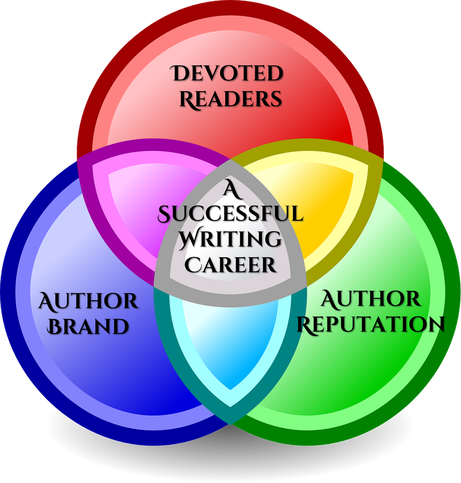 A little while ago, I saw a post in an online networking group defining the term Brand. The writer supplied a bullet list of things that are not a business' Brand. Included were such things as a logo, business cards, YouTube videos, and blog posts. The writer explained that these things are ancillary and not at the heart of branding. They continued to explain that instead, a business’ Brand was defined as the connection between themselves and the customer or client. They refuted the expense of time and money on the other items, declaring them insignificant, and wasted effort. I noodled this around in my head for about a week and considered the question from several angles. I've been active in various networking groups (in-person and online) for over ten years. As a result, I've been attentive to how branding is used across many different industries. So, after considering this writer's point of view and my own experience, I came to this understanding: Perhaps the writer mentioned above overlooks the impact of having both a Brand and a Reputation. The first is meant as a marketing tool to provide comfort and accessibility for prospects. The second instills confidence and security inside an interaction that fosters loyalty and endorsements across years, and we would hope, decades. As with speaking and listening, I believe that we should never focus on one without the other. This is especially true for Independent Authors as they grow their writing careers. Speaking to readers with business cards, websites, YouTube videos, Amazon advertising, podcasts, and other marketing outreach is vital toward expanding the opportunity for discovery. Using these tools requires a fundamental understanding of message presentation and emotional aesthetics. A solid branding practice shares an author's "novel" approach to their iteration of a genre. Physical takeaways or digital evergreen content allows readers to see that our books are interesting, enduring, disarming, and desirable. Branding acts as a gateway for the reader to access the author, coming closer with a warm invitation. Branding is the coy smile shared between an author and a reader across a crowded room. Branding teases a love affair that will evolve in intensity over time. Listening to readers is an entirely different set of practiced skills. The author's Reputation creates a safe space where the reader feels comfortable in the author's vulnerability as they share their imagination. It is the connectivity an author initiates with genuine interest as they engage in conversation at a festival or signing event. Always attentive, interested, and accessible to the reader; eager to hear their impressions of the work and how a reader was touched. Reputation is about building relationships, risking rejection, and delivering on promises made on the page and in person. Listening to readers and learning what they desire most through authentic connection is how authors pave the way for readers to develop a deep devotion to their books and encourage referrals to other readers. Branding is the overture to the symphony of your writing career. Reputation is the intellectual and emotional connections authors establish in a safe space, directly with a reader's heart and soul. Branding and Reputation are intrinsically intertwined. An author cannot expect to reach readers without first extending an invitation, nor can they expect to maintain their Reputation without the emotional attention all relationships expect and require. So, build book trailers, pass out rack cards, and design enticing table displays. But don't neglect the personal interaction between you and your reader. Respond to their conversations at festivals, interact with them on social media, and thank them for their honest reviews, regardless of whether that review was good, bad, or indifferent. Each relationship you invite and maintain will help encourage a footbridge of referrals to your future work. |
WelcomeYou'll find some interesting stuff here... some Op Eds, some Information, Book Reviews, and More. Poke around the categories and see what ruffles your feathers... in a good way! Archives
July 2024
Categories
All
|

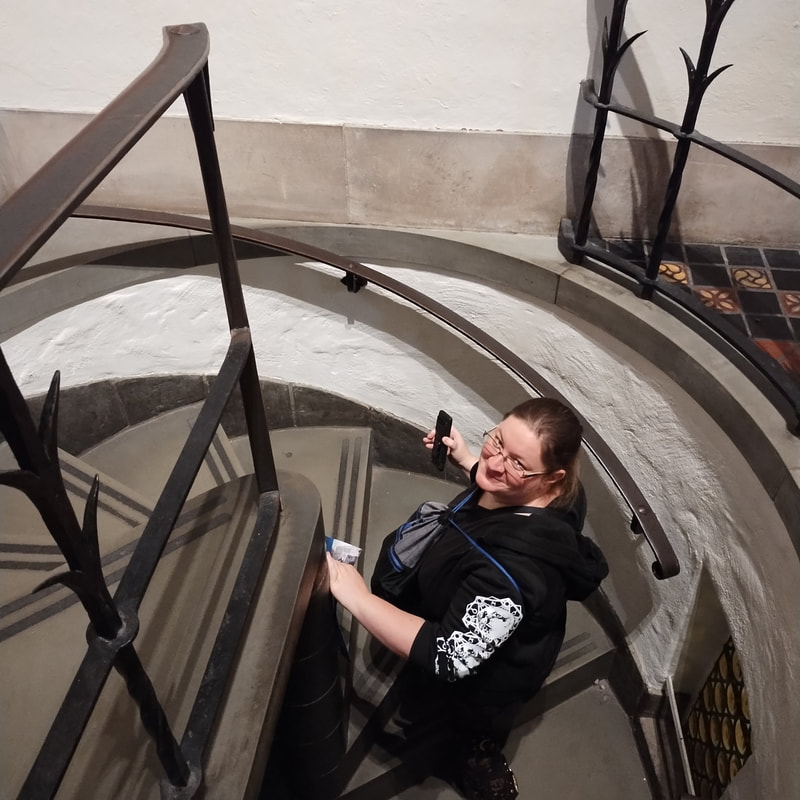
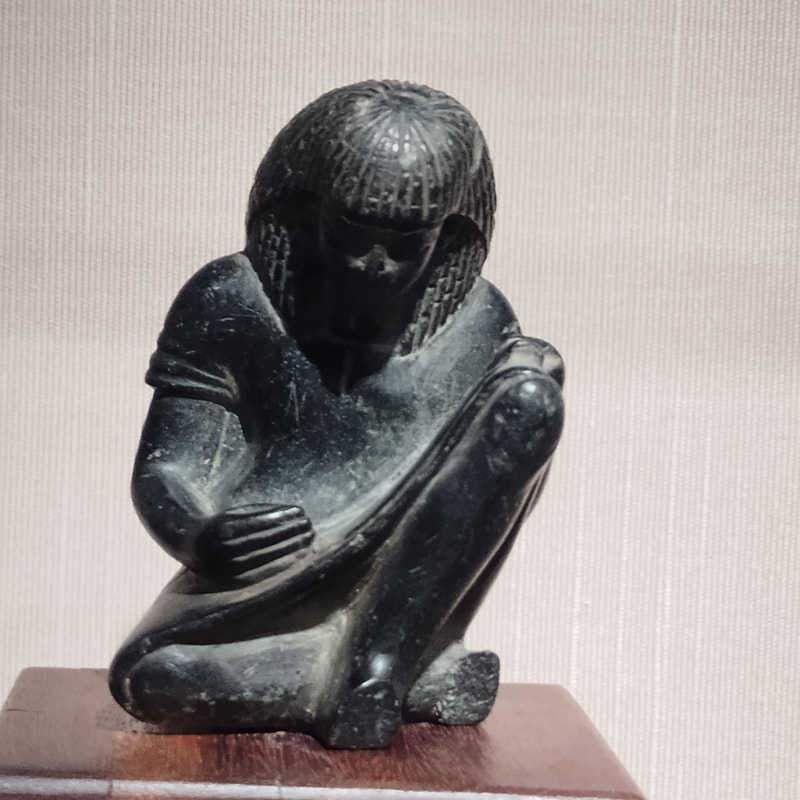

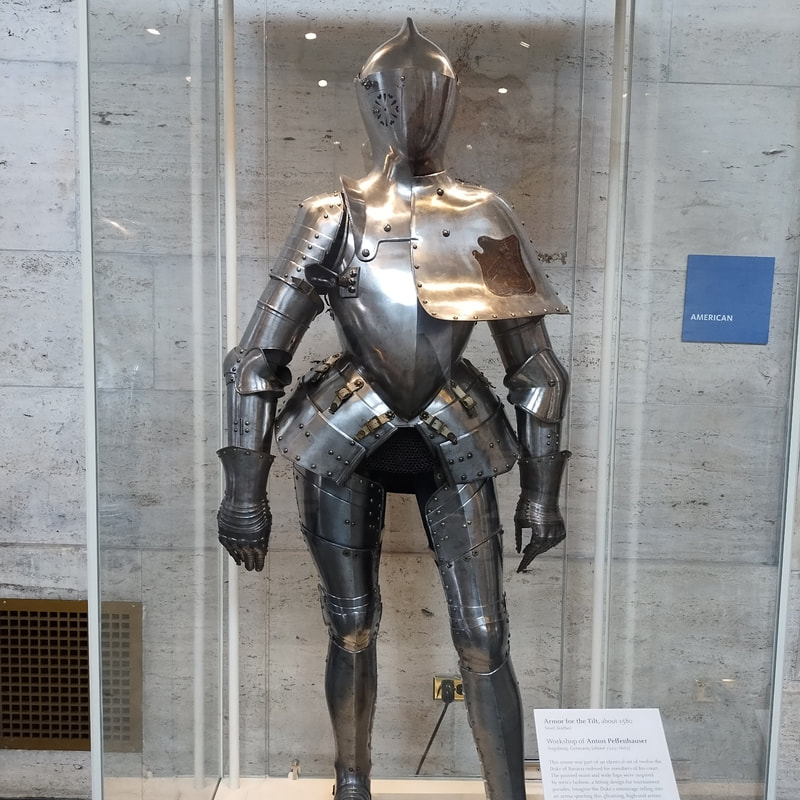
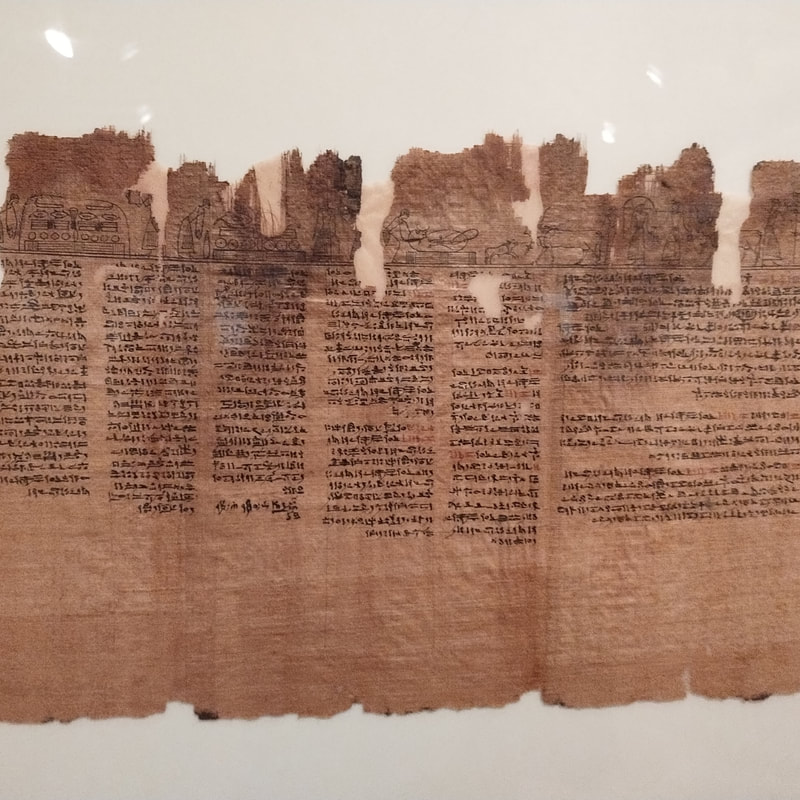
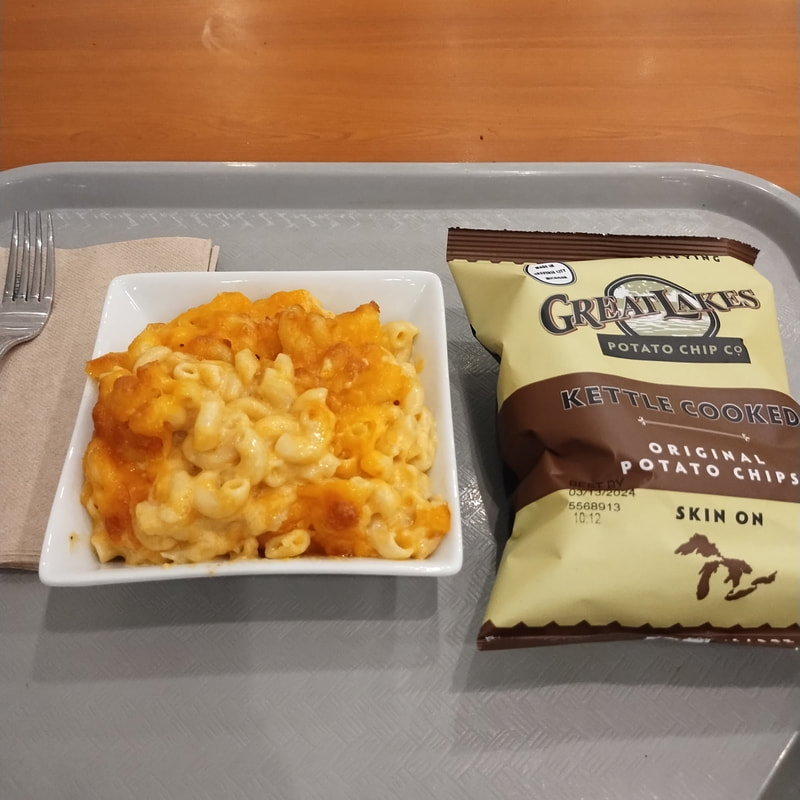


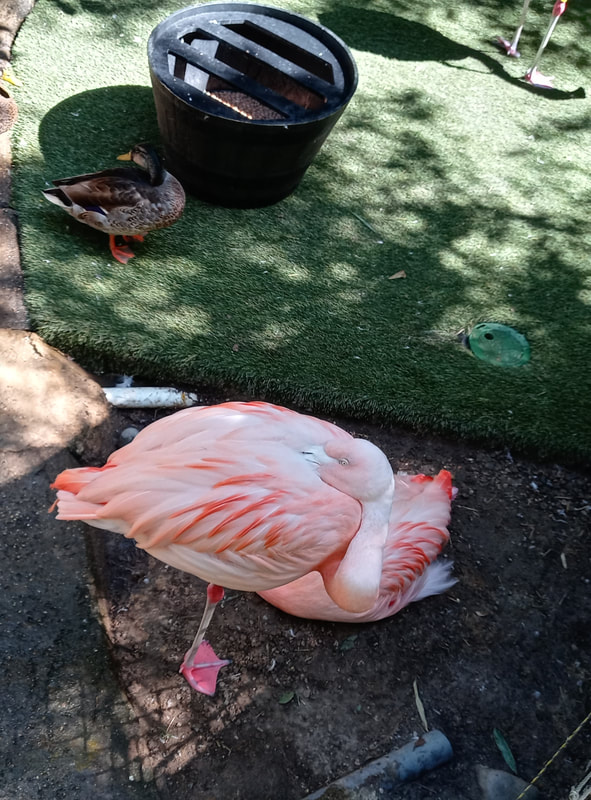
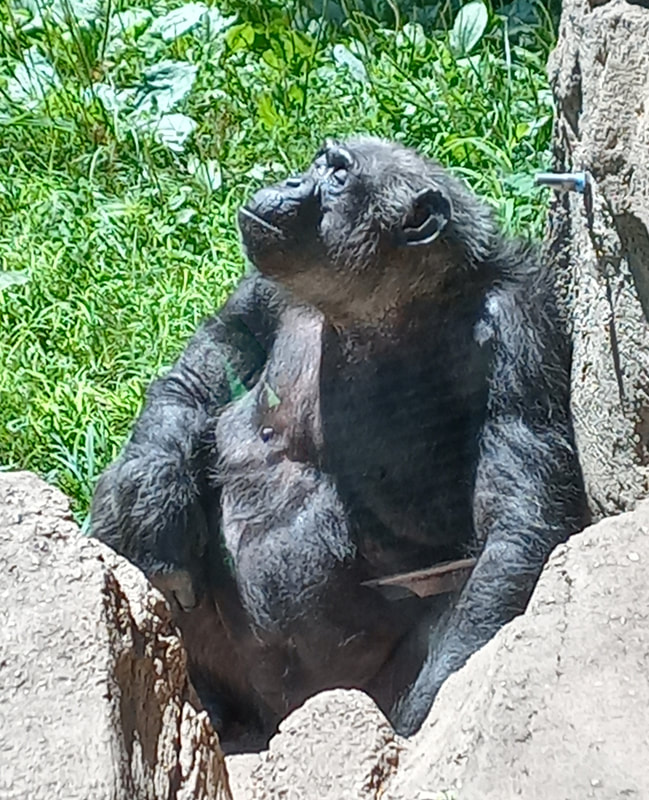
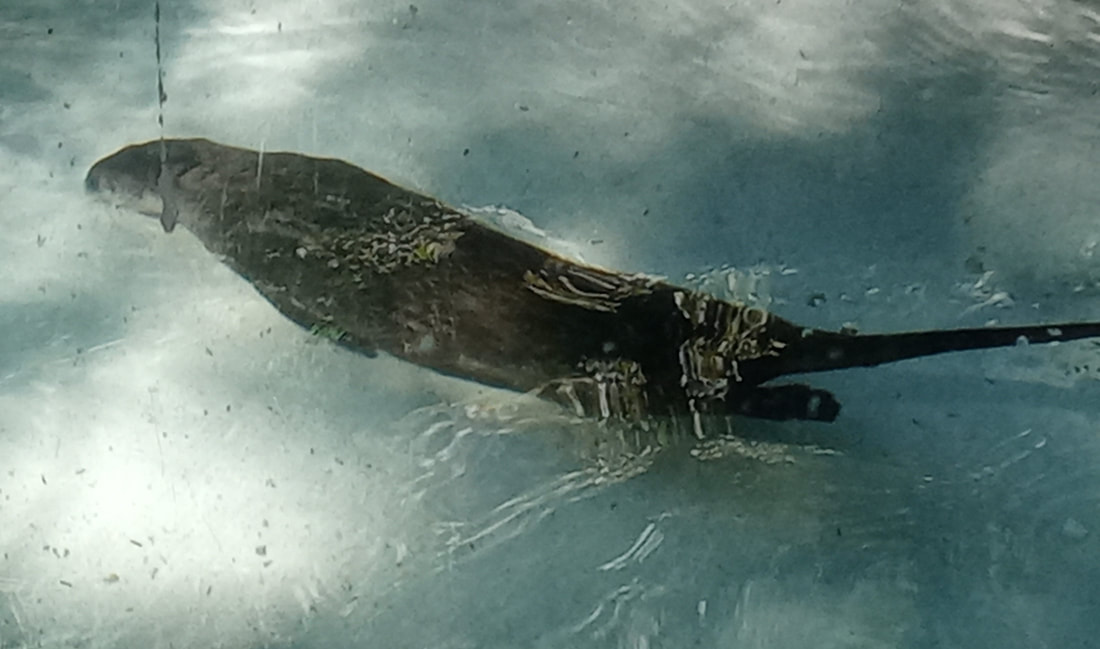
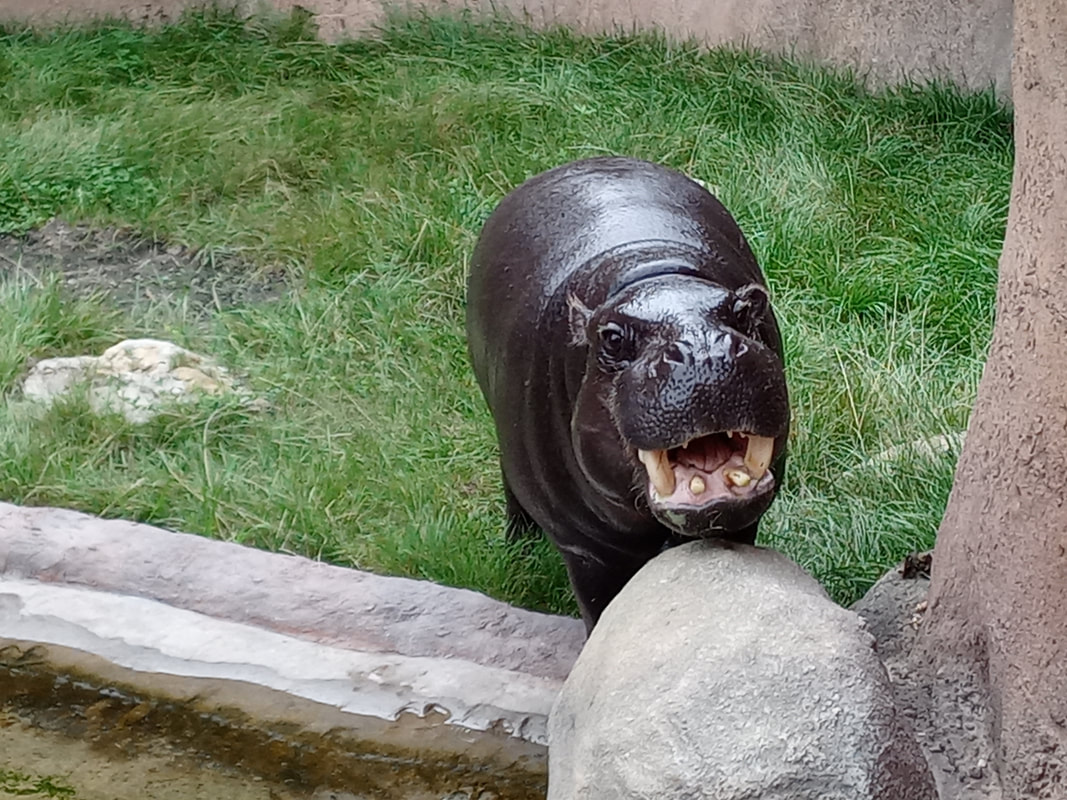
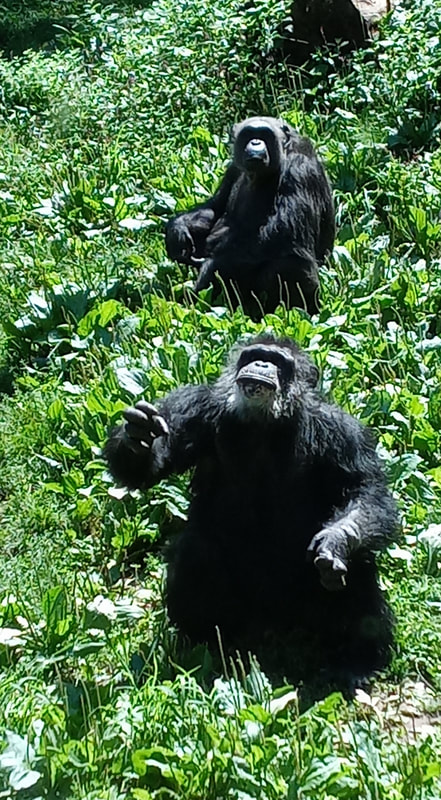
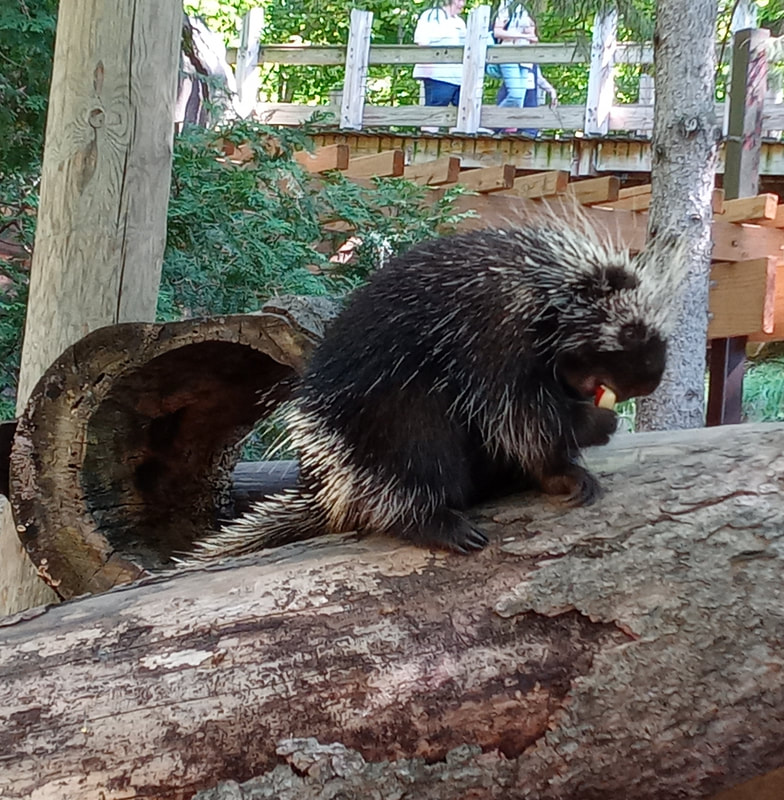
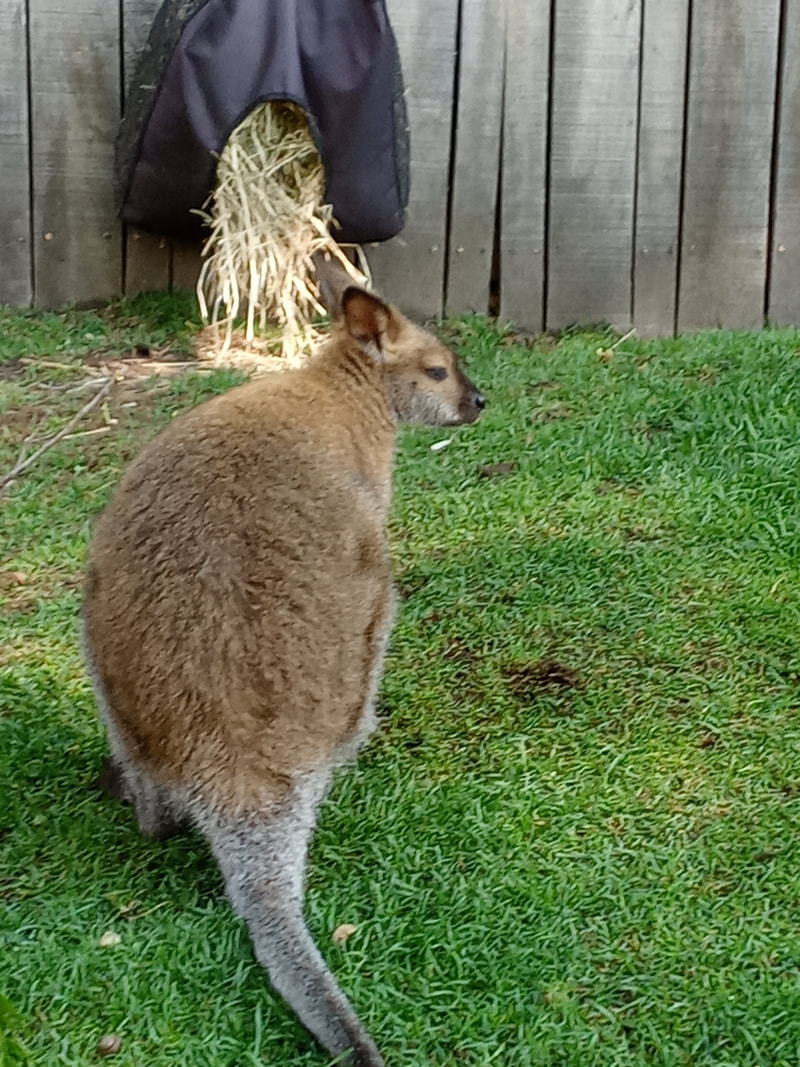
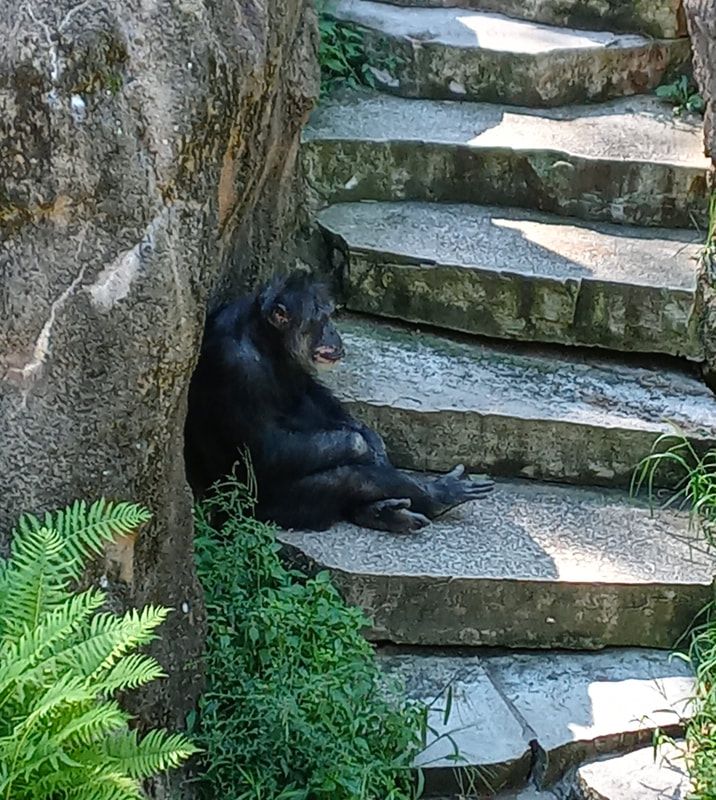

 RSS Feed
RSS Feed